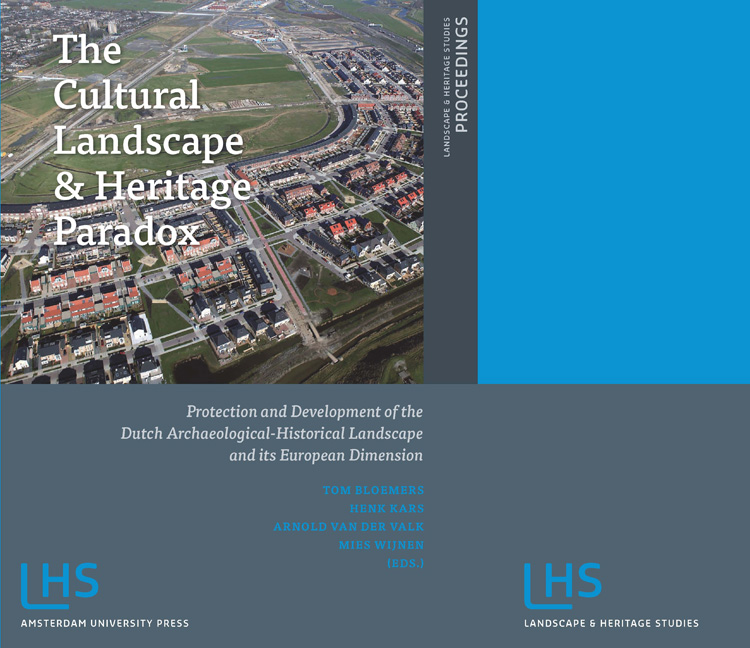 The Cultural Landscape and Heritage Paradox
The Cultural Landscape and Heritage Paradox Book contents
- Frontmatter
- Contents
- Preface
- I INTRODUCTION
- II INSIGHTS AND PROSPECTS OF ARCHAEOLOGICAL-HISTORICAL LANDSCAPE STUDIES
- III LINKING KNOWLEDGE AND ACTION
- IV IMAGINATION - FACTS AND CONSTRUCTIONS
- V SHARING KNOWLEDGE - STORIES, MAPS AND DESIGN
- VI SYNTHESIS AND CONCLUSIONS
- VII MANAGEMENT OF KNOWLEDGE
- VIII AGENDA FOR THE FUTURE
- IX SUMMARY
- X APPENDIX
- Subject Index
- Index of Places and Regions
8 - Gazing at Places we have never been. Landscape, Heritage and Identity. A Comment on Jörg Rekittke & Philip Paar: ‘Past Pictures. Landscape Visualization with Digital Tools’
Published online by Cambridge University Press: 21 January 2021
- Frontmatter
- Contents
- Preface
- I INTRODUCTION
- II INSIGHTS AND PROSPECTS OF ARCHAEOLOGICAL-HISTORICAL LANDSCAPE STUDIES
- III LINKING KNOWLEDGE AND ACTION
- IV IMAGINATION - FACTS AND CONSTRUCTIONS
- V SHARING KNOWLEDGE - STORIES, MAPS AND DESIGN
- VI SYNTHESIS AND CONCLUSIONS
- VII MANAGEMENT OF KNOWLEDGE
- VIII AGENDA FOR THE FUTURE
- IX SUMMARY
- X APPENDIX
- Subject Index
- Index of Places and Regions
Summary
ABSTRACT
Acknowledging the paradigmatic impact of new digital techniques, this contribution questions the depoliticized conceptualization of landscape in modern landscape visualizations from a theoretical and historical perspective. Long after the earlier periods of formal gardening and landscaping, the presentday heritage focus on landscapes is looked upon as the real shift in the perception of landscapes, representing an appropriation by tourists and other groups of people without any historical connection to their history and nature.
KEY WORDS
Landscape, heritage; memory, sites, visual culture; national identity, authenticity, taste, cultural biography
INTRODUCTION
Landscapes are markers of personal as well as national taste, memory and identity. Reflecting on the topic of landscape visualisation, such as presented in this volume by Rekittke and Paar (Rekittke/Paar 2008; Ch. IV.7), I find it fascinating to see how the visual and spatial turns in cultural sciences are radiating into the field of landscape studies. Of course, this should not surprise us since visualisation has always been pivotal to landscape planning and design. That landscapes are not simply there, but shaped and reshaped by human activities, has been well known since Marc Bloch (Bloch 1931) and Hoskins (Hoskins1955) introduced their constructivist views on the making of French and English landscapes. This was still the basic paradigm of the following interpretative methods of landscape-reading used by historical geographers such as Meinig (Meinig 1979) and Cosgrove (Cosgrove 1984). Yet, what we see today is a shift from visual analysis to virtual reality or, to put it differently, from semiotics to experience. Swapping 2D cartography for 3D computer simulations, new methods of landscape visualization are closely related to modern heritage practices and produce experiences by commodifying the past as sites. This might be demonstrated by catchwords like ‘staged authenticity’ (MacCannell 1976), ‘tourist gazing’ (Urry 1991; idem 2002), ‘consumption of places’ (Urry 1995; Ashworth 2005), ‘lieux de mémoire’ (Nora 20022), ‘destinisation’ ( Kirshenblatt-Gimblett 1998), ‘Erinnerungsräume’ (Assmann 1999) and ‘prosthetic memory’ (Landsberg 2004). What we consume as heritage are brand new fabrications (Lowenthal 1998) which help us to experience ‘our’ culture rooted in nature and history, or more precisely in landscapes (Fig. 1).
LIVING AND VISUAL LANDSCAPES
Such a dynamic approach of both the production, consumption, making and experiencing of historical landscapes confronts us with at least two paradoxes.
- Type
- Chapter
- Information
- The Cultural Landscape and Heritage ParadoxProtection and Development of the Dutch Archaeological-Historical Landscape and its European Dimension, pp. 321 - 328Publisher: Amsterdam University PressPrint publication year: 2010


